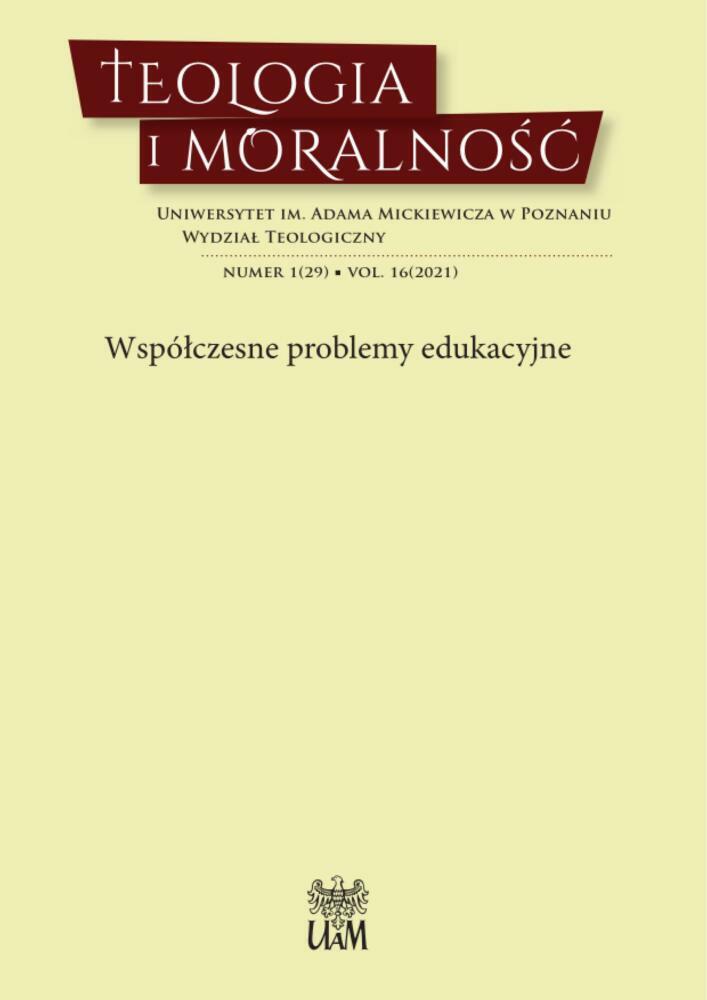Abstract
Reflectivity is an important competence of both the educator, teacher and tutor, as well as the learner, pupil. Reflectiveness is the readiness of people working in the educational space to reflect, ponder and analyze. Reflectiveness allows to depart from patterns, enter into oneself and at the same time go beyond oneself, never stop looking for new ways and solutions, and look critically at the achieved goals. Reflectiveness contributes to building the human layer of experience, which becomes the basis for cognition and understanding of the world.
In the context of the challenges faced by modern man in connection with technological, information and globalization civilization, it is necessary to develop the ability to reflectivity, especially in education. Therefore, the next stage of considerations will be the analysis of the issue of reflectivity in the context of Ignatian pedagogy, dating back to the 16th century, but newly formulated and articulated in documents developed in the 1980s. On their basis, the Ignatian model of upbringing proposed to contemporary educational institutions and its components will be discussed: context - experience - reflection - action - evaluation. Each of these five elements is important, and integrated with each other, they influence the dynamics of Ignatian pedagogy. The role of reflection will be shown, which in the Ignatian pedagogy model is an element enabling growth and development. This reflection is fully mature only if it leads a person to make a decision and commitment, that is, to action. Reflection understood in this way is a way of proceeding that allows for the integral formation of the pupil. Finally, postulates for practice and education are presented relating to stimulating and developing an attitude of reflection in pupils.
References
Carr, Alan. 2004. Positive Psychology. New York: Brunner-Routledge.
Chrost, Marzena. 2017. Refl eksyjność w wychowaniu. Proces poznawania siebie, Studia Paedagogica Ignatiana, 2, 131-144. DOI: http://dx.doi.org/10.12775/SPI.2017.2.006
Chrost, Marzena. 2018a. Refl eksyjność komponentem mądrości praktycznej. W: Sprawności moralne jako przedmiot refl eksji wychowawczej, red. Iwona Jazukiewicz, Ewa Rojewska, 33-47. Szczecin: Wydawnictwo Naukowe Uniwersytetu Szczecińskiego.
Chrost, Marzena. 2018b. Refl eksyjność wyzwaniem współczesnego świata, Studia Paedagogica Ignatiana, 4, 55-66. DOI: http://dx.doi.org/10.12775/SPI.2018.4.003
Dróżka, Wanda. 2001. Od pewności ku refl eksyjności w zawodzie nauczycielskim. Przyczynek do dyskusji, Przegląd Pedagogiczny, 1, 135-151.
Dulles, Avery. 2008. Church and Society. The Laurence J. McGinely Lectures, 1988-2007. New York: Wydawnictwo Fordham University Press.
Duminuco, Vincent. 2008. Formation or Indoctrination in Ignatian Pedagogy?. W: Ignatian Pedagogy for the Challenges of Humanism Today, red. Wit Pasierbek, 193-210. Kraków: Wyższa Szkoła Filozoficzno Pedagogiczna Ignatianum i Wydawnictwo WAM.
Ignatian Pedagogy: A Practical Approach. Curia Praepositi Generalis Societatis Iesu. 1993. Roma. Polnische Version: Pedagogika ignacjańska. Podejście praktyczne. 2006. W: Podstawy edukacji ignacjańskiej, tłum. Bogusław Steczek, 97-165. Kraków: Wyższa Szkoła Filozofi czno-Pedagogiczna Ignatianum i Wydawnictwo WAM.
Klus-Stańska, Dorota. 2006. Doświadczenia pedagogiczne nauczycieli jako źródło ich niezdolności do refleksji nad własną aktywnością zawodową. W: Sapientia et adiumentum. W trosce o rozwój innych. Studia dedykowane prof. Zbigniewowi Kwiecińskiemu, red. Jarosław Michalski, 155-176. Olsztyn: Wydawnictwo Uniwersytetu Warmińsko-Mazurskiego.
Łacny, Paweł. 2010. Jezuickie „magis” na przykładzie życia ojca Matteo Ricciego SJ (1552-1610). W: Pedagogika ignacjańska: historia, teoria, praktyka, red. Anna Królikowska, 151-182. Kraków: Wyższa Szkoła Filozoficzno-Pedagogiczna Ignatianum i Wydawnictwo WAM.
Marek, Zbigniew. 2017. Pedagogika towarzyszenia. Perspektywa tradycji ignacjańskiej. Kraków: Akademia Ignatianum w Krakowie.
Mółka, Janusz. 2010. Personalistyczny paradygmat pedagogiki ignacjańskiej. W: Paradygmaty akademickiego kształcenia pedagogów, red. Anna Sajdak i Danuta Skulicz, 219-227. Kraków: Wydawnictwo Uniwersytetu Jagiellońskiego.
Prochaska, James. 1999. How Do People Change, and How Can We Change to Help Many More People?. W: The Heart and Soul of Change, red. Mark A. Hubble, Barry L. Duncan i Scott D. Miller, 227-255. Washington: American Psychological Association.
Rozmarynowska, Karolina. 2015. Mądrość praktyczna jako zdolność do realizowania norm moralnych. W: Z problematyki norm, zasad i mądrości praktycznej. Studia i rozprawy z etyki normatywnej, red. Piotr Duchliński i Tomasz Homa, 109-119. Kraków: Akademia Ignatianum i Wydawnictwo WAM.
Smółka, Paweł. 2008. Kompetencje społeczne. Metody pomiaru i doskonalenia umiejętności interpersonalnych, Kraków: Wolters Kluwer Polska.
The Characteristics of Jesuit Education. Roma Acta Romana Societatis Iesu. 1986. vol. XIX, fasc. III, 770-832. Polnische Version: Charakterystyczne cechy jezuickiego wychowania. 2006. W:
Podstawy edukacji ignacjańskiej, tłum. Bogusław Steczek, 7-95. Kraków: Wyższa Szkoła Filozofi czno-Pedagogiczna Ignatianum i Wydawnictwo WAM.
Żmudziński, Wojciech. 2008. Fundament ignacjańskiej pedagogiki. W: Pedagogika ignacjańska wobec wyzwań współczesnego humanizmu, red. Wit Pasierbek, 51-63. Kraków: Wyższa Szkoła
Filozofi czno-Pedagogiczna Ignatianum i Wydawnictwo WAM.
Żywczok, Alicja. 2017. W kierunku przemiany wewnętrznej. Refl eksja jako biografi czny punkt zwrotny. W: Codzienność jako wyzwanie edukacyjne. T. 2: Refl eksyjność w codzienności edukacyjnej, red. Iwona Paszenda, 29-46. Wrocław: Instytut Pedagogiki Uniwersytetu Wrocławskiego.
License
Copyright (c) 2021 Marzena Chrost

This work is licensed under a Creative Commons Attribution-NoDerivatives 4.0 International License.

